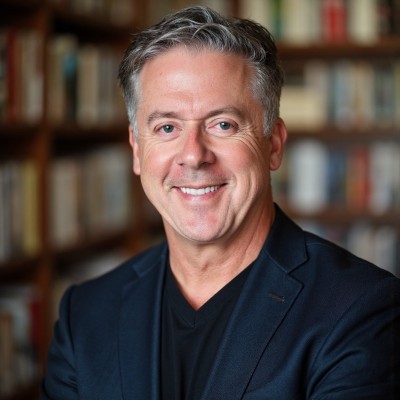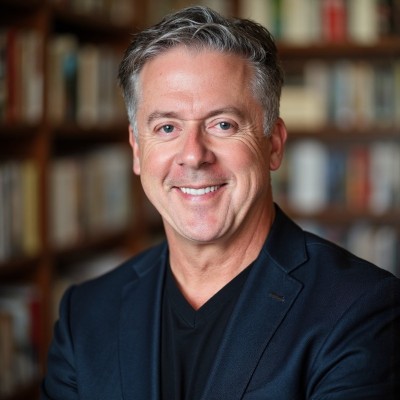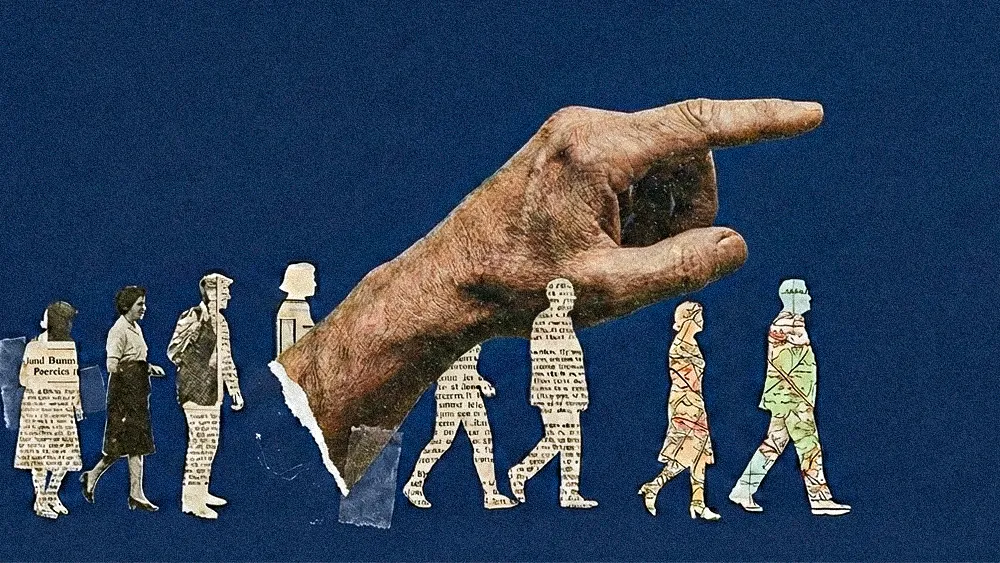How top talent leaders are tapping less conventional sources to inspire teams

Key Points
Business leaders are finding traditional corporate playbooks stale, creating a hunger for fresh perspectives on growth and leadership.
Steve Cadigan, a talent strategist and LinkedIn’s first CHRO, argues that leaders should look to unexpected sources for inspiration, including the strategic masterstrokes of pop superstar Taylor Swift.
Cadigan explains how Swift’s response to crisis and her cultivation of a massive “goodwill bank” with her audience offer a powerful playbook for building resilient organizations.
He also stresses the importance of creating a culture of trust where innovation is everyone’s job and leaders provide “space to think” away from the daily grind.
In a world that's changing faster than ever, we should be looking to different fountains to drink from for inspiration. Why not learn from someone who has outmaneuvered her competition and turned performance into experience? For HR leaders shaping culture and energy, Taylor Swift is more than worthy of attention.

Steve Cadigan
Talent Hacker & Advisor
Cadigan Talent Ventures
Taylor Swift: global superstar, musician, cultural force, and… unlikely business leader? As executives grow weary of recycled wisdom and empty mantras from a corporate world saturated with an echo chamber of business guru wisdom, many are turning to unconventional sources of inspiration. The fatigue with the status quo has created a hunger for fresh perspectives and novel approaches to leadership, and Swift’s creativity, resilience, and trust-building are stepping in to fill that gap.
In fact, her impact on corporate culture is undeniable. A new report from BambooHR covering Swift and the workplace found 58% of Swifties often discuss pop culture with their coworkers and 6% of salaried workers plan to take off for the release of her next album, The Life of a Showgirl.
We spoke with Steve Cadigan, a Talent Hacker & Advisor at Cadigan Talent Ventures and previously LinkedIn’s first CHRO, who has spent his career building world-class teams at the intersection of disruption and reinvention. Cadigan has explored this very topic, drawing compelling parallels between the pop superstar and effective business leadership in a recent episode of his Workquake Weekly podcast. He argued that in an era of unprecedented change, the lessons from a global icon like Swift are not just relevant; they are essential.
“In a world that’s changing faster than ever, we should be looking to different fountains to drink from for inspiration. Why not learn from someone who has outmaneuvered her competition and turned performance into experience? For HR leaders shaping culture and energy, Taylor Swift is more than worthy of attention.”
Perhaps the most potent lesson from the “Taylor Swift playbook” is her elegant response to crisis. When the ownership of her master recordings was sold out from under her, she didn’t just accept the loss. Instead, she embarked on a journey to re-record her entire back catalog, turning a potential career-ending defeat into an unprecedented commercial and cultural victory. This move, as Cadigan explained, was a masterclass in rewriting the rules.
Three-dimensional chess: “Not only was it remarkable, it was elegant. The way she did that was like three-dimensional chess. It was a checkmate,” Cadigan explained. “She re-recorded her entire catalog, made it stronger, and rendered the originals virtually worthless—turning a potential career-ending setback into one of the most important business moves in modern music.”
The goodwill bank: “You need to build a huge bank of goodwill over time so that when something goes sideways—and it always will—you get the benefit of the doubt,” Cadigan said. “That goodwill shields you from the inevitable sniper shot of criticism. Instead of piling on, people drown it out and say, ‘Come on, she’s human.'”
The ability to weather storms and turn setbacks into triumphs is built on a foundation of deep, unwavering trust. Cadigan argued that Swift has strategically built a massive “goodwill bank” with her audience, an asset that leaders can and should replicate within their own organizations. She earned it through consistency, kindness, and authentic connection, creating a bond so strong it provides cover for inevitable mistakes and missteps.
This philosophy of looking outward for inspiration isn’t just theoretical. Cadigan put it into practice during his time at LinkedIn with the creation of the company’s renowned speaker series. The program was intentionally designed not to solve a specific business problem, but to bring in diverse, inspiring voices—from blind athletes to famous generals—to challenge assumptions and spark new ways of thinking.
Space to think differently: “Our goal was to invite people into our world who saw and solved problems differently,” Cadigan explained. “What leaders need today is the ability to think differently. We had no agenda beyond opening minds and giving people space to think. Creating an environment where you can drink from the fountain of thought is incredibly valuable.”
A culture of openness and trust ultimately leads to a more dynamic and innovative organization, one where good ideas can come from anywhere. Cadigan argued against siloing innovation, suggesting that a healthy culture empowers every single employee to contribute.
Innovation is everyone’s job: “The moment a company creates an innovation department, it sends the wrong message that only certain people get to innovate,” Cadigan said. “Every employee should be the innovation department, working in a culture of trust where anyone feels comfortable standing up with a new idea.”
Ultimately, the most profound lesson may be the most counter-intuitive. In a business world obsessed with speed, productivity, and relentless optimization, the greatest insights often emerge from the quiet moments in between. The true value of bringing in outside voices or cultivating a new hobby isn’t just about the direct inspiration, but about creating the mental space for dots to connect.
“People need an opportunity to get out of the grind. It’s counter to the mantra of this relentless pursuit of efficiency and productivity, but it’s in the quiet moments where the greatest thoughts happen.”
The moment a company creates an innovation department, it sends the wrong message that only certain people get to innovate. Every employee should be the innovation department, working in a culture of trust where anyone feels comfortable standing up with a new idea.

Steve Cadigan
Talent Hacker & Advisor
Cadigan Talent Ventures
The moment a company creates an innovation department, it sends the wrong message that only certain people get to innovate. Every employee should be the innovation department, working in a culture of trust where anyone feels comfortable standing up with a new idea.

Steve Cadigan
Talent Hacker & Advisor
Cadigan Talent Ventures
Related articles
TL;DR
Business leaders are finding traditional corporate playbooks stale, creating a hunger for fresh perspectives on growth and leadership.
Steve Cadigan, a talent strategist and LinkedIn’s first CHRO, argues that leaders should look to unexpected sources for inspiration, including the strategic masterstrokes of pop superstar Taylor Swift.
Cadigan explains how Swift’s response to crisis and her cultivation of a massive “goodwill bank” with her audience offer a powerful playbook for building resilient organizations.
He also stresses the importance of creating a culture of trust where innovation is everyone’s job and leaders provide “space to think” away from the daily grind.

Steve Cadigan
Cadigan Talent Ventures
Talent Hacker & Advisor

Talent Hacker & Advisor
Taylor Swift: global superstar, musician, cultural force, and… unlikely business leader? As executives grow weary of recycled wisdom and empty mantras from a corporate world saturated with an echo chamber of business guru wisdom, many are turning to unconventional sources of inspiration. The fatigue with the status quo has created a hunger for fresh perspectives and novel approaches to leadership, and Swift’s creativity, resilience, and trust-building are stepping in to fill that gap.
In fact, her impact on corporate culture is undeniable. A new report from BambooHR covering Swift and the workplace found 58% of Swifties often discuss pop culture with their coworkers and 6% of salaried workers plan to take off for the release of her next album, The Life of a Showgirl.
We spoke with Steve Cadigan, a Talent Hacker & Advisor at Cadigan Talent Ventures and previously LinkedIn’s first CHRO, who has spent his career building world-class teams at the intersection of disruption and reinvention. Cadigan has explored this very topic, drawing compelling parallels between the pop superstar and effective business leadership in a recent episode of his Workquake Weekly podcast. He argued that in an era of unprecedented change, the lessons from a global icon like Swift are not just relevant; they are essential.
“In a world that’s changing faster than ever, we should be looking to different fountains to drink from for inspiration. Why not learn from someone who has outmaneuvered her competition and turned performance into experience? For HR leaders shaping culture and energy, Taylor Swift is more than worthy of attention.”
Perhaps the most potent lesson from the “Taylor Swift playbook” is her elegant response to crisis. When the ownership of her master recordings was sold out from under her, she didn’t just accept the loss. Instead, she embarked on a journey to re-record her entire back catalog, turning a potential career-ending defeat into an unprecedented commercial and cultural victory. This move, as Cadigan explained, was a masterclass in rewriting the rules.
Three-dimensional chess: “Not only was it remarkable, it was elegant. The way she did that was like three-dimensional chess. It was a checkmate,” Cadigan explained. “She re-recorded her entire catalog, made it stronger, and rendered the originals virtually worthless—turning a potential career-ending setback into one of the most important business moves in modern music.”
The goodwill bank: “You need to build a huge bank of goodwill over time so that when something goes sideways—and it always will—you get the benefit of the doubt,” Cadigan said. “That goodwill shields you from the inevitable sniper shot of criticism. Instead of piling on, people drown it out and say, ‘Come on, she’s human.'”
The ability to weather storms and turn setbacks into triumphs is built on a foundation of deep, unwavering trust. Cadigan argued that Swift has strategically built a massive “goodwill bank” with her audience, an asset that leaders can and should replicate within their own organizations. She earned it through consistency, kindness, and authentic connection, creating a bond so strong it provides cover for inevitable mistakes and missteps.

Steve Cadigan
Cadigan Talent Ventures
Talent Hacker & Advisor

Talent Hacker & Advisor
This philosophy of looking outward for inspiration isn’t just theoretical. Cadigan put it into practice during his time at LinkedIn with the creation of the company’s renowned speaker series. The program was intentionally designed not to solve a specific business problem, but to bring in diverse, inspiring voices—from blind athletes to famous generals—to challenge assumptions and spark new ways of thinking.
Space to think differently: “Our goal was to invite people into our world who saw and solved problems differently,” Cadigan explained. “What leaders need today is the ability to think differently. We had no agenda beyond opening minds and giving people space to think. Creating an environment where you can drink from the fountain of thought is incredibly valuable.”
A culture of openness and trust ultimately leads to a more dynamic and innovative organization, one where good ideas can come from anywhere. Cadigan argued against siloing innovation, suggesting that a healthy culture empowers every single employee to contribute.
Innovation is everyone’s job: “The moment a company creates an innovation department, it sends the wrong message that only certain people get to innovate,” Cadigan said. “Every employee should be the innovation department, working in a culture of trust where anyone feels comfortable standing up with a new idea.”
Ultimately, the most profound lesson may be the most counter-intuitive. In a business world obsessed with speed, productivity, and relentless optimization, the greatest insights often emerge from the quiet moments in between. The true value of bringing in outside voices or cultivating a new hobby isn’t just about the direct inspiration, but about creating the mental space for dots to connect.
“People need an opportunity to get out of the grind. It’s counter to the mantra of this relentless pursuit of efficiency and productivity, but it’s in the quiet moments where the greatest thoughts happen.”




